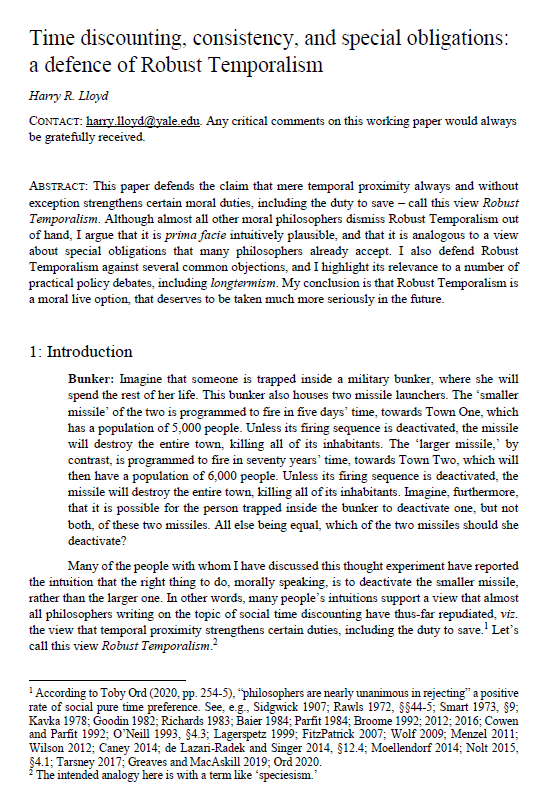Time discounting, consistency and special obligations: a defence of Robust Temporalism
Harry R. Lloyd (Yale University)
GPI Working Paper No. 11-2021
This is the winning entry of the Essay Prize for global priorities research 2021. The uploaded paper is the full, revised draft of the abridged paper submitted for the prize competition.
This paper defends the claim that mere temporal proximity always and without exception strengthens certain moral duties, including the duty to save – call this view Robust Temporalism. Although almost all other moral philosophers dismiss Robust Temporalism out of hand, I argue that it is prima facie intuitively plausible, and that it is analogous to a view about special obligations that many philosophers already accept. I also defend Robust Temporalism against several common objections, and I highlight its relevance to a number of practical policy debates, including longtermism. My conclusion is that Robust Temporalism is a moral live option, that deserves to be taken much more seriously in the future.
Other working papers
Numbers Tell, Words Sell – Michael Thaler (University College London), Mattie Toma (University of Warwick) and Victor Yaneng Wang (Massachusetts Institute of Technology)
When communicating numeric estimates with policymakers, journalists, or the general public, experts must choose between using numbers or natural language. We run two experiments to study whether experts strategically use language to communicate numeric estimates in order to persuade receivers. In Study 1, senders communicate probabilities of abstract events to receivers on Prolific, and in Study 2 academic researchers communicate the effect sizes in research papers to government policymakers. When…
The epistemic challenge to longtermism – Christian Tarsney (Global Priorities Institute, Oxford University)
Longtermists claim that what we ought to do is mainly determined by how our actions might affect the very long-run future. A natural objection to longtermism is that these effects may be nearly impossible to predict— perhaps so close to impossible that, despite the astronomical importance of the far future, the expected value of our present actions is mainly determined by near-term considerations. This paper aims to precisify and evaluate one version of this epistemic objection to longtermism…
The evidentialist’s wager – William MacAskill, Aron Vallinder (Global Priorities Institute, Oxford University) Caspar Österheld (Duke University), Carl Shulman (Future of Humanity Institute, Oxford University), Johannes Treutlein (TU Berlin)
Suppose that an altruistic and morally motivated agent who is uncertain between evidential decision theory (EDT) and causal decision theory (CDT) finds herself in a situation in which the two theories give conflicting verdicts. We argue that even if she has significantly higher credence in CDT, she should nevertheless act …

